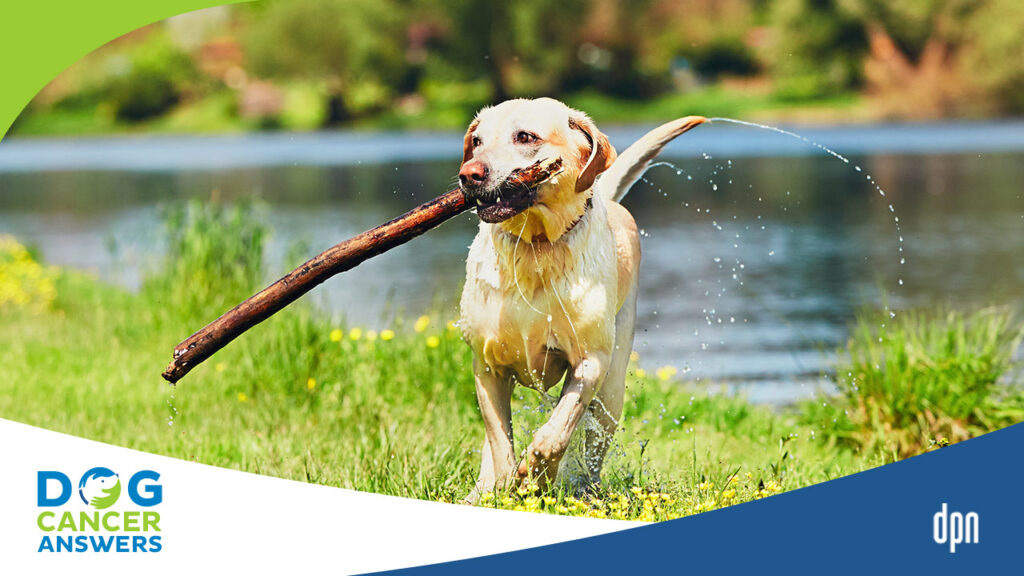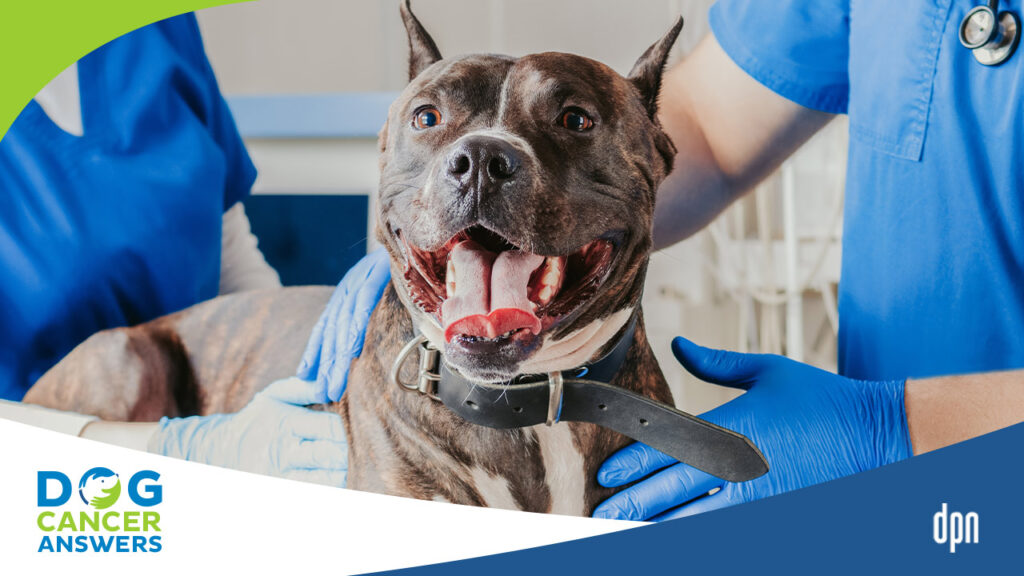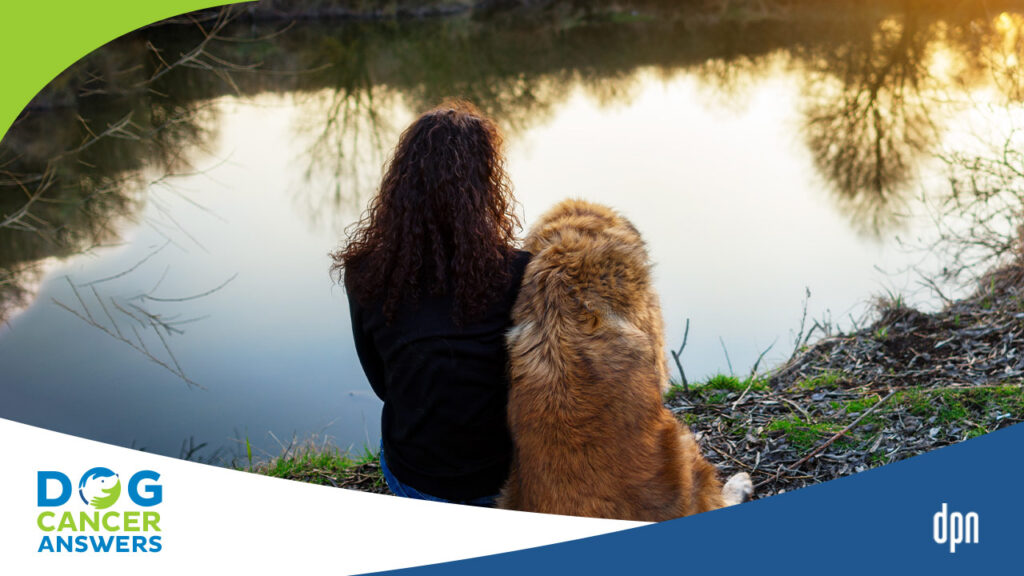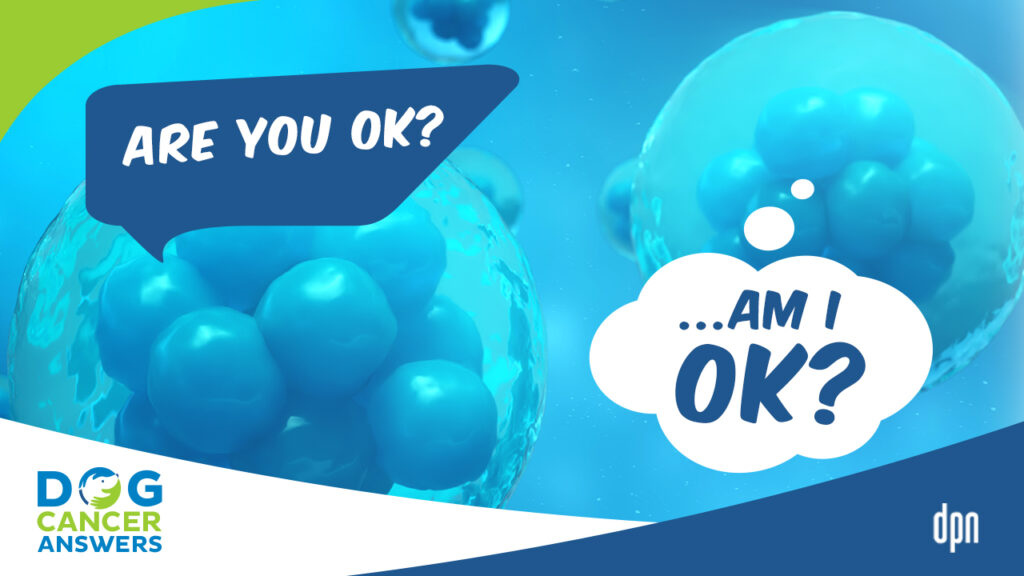EPISODE 107 | RELEASED February 8, 2021
What Are the Symptoms of Dog Cancer? │ Dr. Demian Dressler Q&A
Create a symptom checklist you can take to your next vet appointment for further evaluation from your dog’s veterinarian.
SHOW NOTES
In a quick but very helpful lesson, Dr. Demian Dressler discusses some of the common signs and symptoms that he sees in dogs that have cancer. Beginning with the tip of your dog’s nose to the ends of their toes and every one of your dog’s body organs in-between, Dr. Dressler explains the many signs that you should be on the lookout for if your dog may have cancer.
>> Dr. Demian Dressler: Most cancers in terms of statistical probability, pop up in the skin. That’s the number one area for dog cancer, but you can get cancers everywhere in the body. You can get cancer in the eye, the ear, the mouth. You can get cancer in the intestine, the bladder, the heart, the lungs, the pancreas, the bones, joints, the nail bed, under the tongue — and so, you’re going to have different signs depending on the location of the disease.
>> Narrator: Welcome to Dog Cancer Answers, where we help you help your dog with cancer. Here’s your host, James Jacobson.
>> James Jacobson: Hello friend. Thank you for joining me this week on Dog Cancer Answers. On today’s question and answer episode, we speak with Dr. Demian Dressler, author of “The Dog Cancer Survival Guide: Full Spectrum Treatments to Optimize Your Dog’s Life Quality and Longevity.”
In a quick, but very helpful lesson, Dr. Dressler discusses some of the signs and symptoms that he frequently sees in dogs that have cancer. Beginning with the tip of your dog’s nose to the end of their toes and every body organ in-between, he will tell you what you need to be on the lookout for.
But please remember, when discussing cancer symptoms, it actually takes a diagnosis from your dog’s veterinarian or veterinary oncologist — and probably some lab work and maybe even a biopsy or two to make a definitive determination. If your dog is showing one or more of the symptoms mentioned in this episode, I encourage you to take this as a sign to schedule that much needed appointment with your dog’s veterinarian, because the sooner you get them checked out, the better you both will feel.
Now let’s get started with this week’s episode on common signs and symptoms of cancer in dogs.
Dr. Dressler, thanks for being with us today.
>> Dr. Demian Dressler: Pleasure.
>> James Jacobson: One of the questions that I got here is, my dogs acting fine. How can I tell if he’s sick? What are the symptoms? How do I know if my dog has cancer?
>> Dr. Demian Dressler: Well, unfortunately, the way that you get a cancer diagnosis is usually by getting a biopsy or a test on cells in the body — and then the pathologist will look at those cells and that’s done at the vet and then you get a pathology report, and they will tell you if it’s cancer, if it’s not cancer.
That’s actually the way to do it. So, you can’t really do a cancer diagnosis at home. Cancers, generally speaking, have a whole variety of different signs because it’s going to be dependent on where that thing is popping up in the body. So, if you have skin cancer that you can see with your eyes, which just most of the time.
Most cancers in terms of statistical probability, pop up in the skin. That’s the number one area for dog cancer, but you can get cancers everywhere in the body. You can get cancer in the eye, the ear, the mouth. You can get cancer in the intestine, the bladder, the heart, the lungs, the pancreas, the bones, the joints, the nail bed, under the tongue — and so, you’re going to have different signs depending on the location of the disease.
So, they’re all over the place. The most important thing to say is, does my dog have a growth? Is there a bump there that I can see? And if there is a bump there and that bump is increasing in size — and by the way, you know that it increased in size because there wasn’t a bump and now there is a bump. So, by definition it has already increased in size because it grew because something that wasn’t there before and then is there now by definition grew.
So, generally speaking, what I tell people is, if it’s more than about an eighth of an inch across and it is also increasing in size — from that point, you should get it tested as opposed to watching it. Now, different people will have different opinions on this matter — like what’s the cutoff, how do you know what’s dangerous and what’s not?
But I say, if you can see a bump and it’s a BB size and it’s getting bigger, get it tested and, or get it removed and tested. So, that’s the biggest thing. Now you’ve also got your internal cancers. So, brain cancers can be a loss of balance.
Nasal cancers can be sneezing and blood coming out of a one or both nostrils.
Eye cancers can be changes in the color of the eye or squinting or bleeding within the eyeball.
Mouth cancers will act like dental disease, sometimes. They get bad breath and they’ll get, uh, inflamed or infected in the area of the tumor and after a while it becomes painful.
Cancers of the bones or the joints usually will have pain, which is usually limping.
Cancers of the heart will show you signs of that the dog has heart disease. The heart is not working right cause there’s a tumor in there, and so those guys will cough more and those guys usually become more lethargic — sometimes they’re weak and wobbly.
Cancers of the bladder, there’ll be often blood in the urine — repeating infections. By the way, a lot of times it’ll look like an infection over and over and over again, because it is getting infected because there’s an erosion inside the lining of the bladder, that’s a tumor. So, repeat infections, those guys strain to go pee a lot.
Kidneys, reduced appetite, vomiting, increased thirst and urination.
Pancreas, reduced appetite, vomiting — weight loss is really common with chronic cancers that are severe across the board, usually of muscle.
>> James Jacobson: A lot of weight loss, or just a little bit?
>> Dr. Demian Dressler: The chronic cancers as it goes on and on and on and if it’s a bad cancer, the cancer will start to hijack the body’s metabolism, so the muscles will get really thin and you’ll see that — but that’s only in advanced cancers, that’s not early.
>> James Jacobson: So, not like a little — like some ounces?
>> Dr. Demian Dressler: No, no. But a bad internal cancer, particularly — like it’ll hijack the metabolism and the dog will start losing weight and it will be unexplained, and that can be the first sign of it. It’s good to be sensitive with that type of thing.
Let’s see liver, vomiting, lethargy, loss of appetite — sometimes the eyes will get yellow.
The adrenal cancers, those are across the board, it depends on what hormone is involved. So, there’s a whole bunch of different signs. I think the important thing to understand is, is your dog’s appetite normal, is the energy level normal, do you have vomiting, do you have diarrhea, is there coughing, is there sneezing? Are there other things that you can easily see at home — and is there a growing bump? That’s obviously a big one.
And the final thing is, get things done proactively with your veterinarian. If you have an old dog twice a year, older than eight, get in there and get the lab work done, get the exams done, get the bumps tested. And if you’ve got a high cancer breed, like a Golden Retriever, a Rottweiler or something like that — basically if you have a purebred, large breed dog, you know, it’s a good idea to get the internal organs checked. Not only with testing, that’s like lab work — but also sometimes with imaging. Get a once a year abdominal ultrasound, get some chest x-rays done once a year — just something like that is a good general practice, if budget allows to check on these things.
>> James Jacobson: You said early on that skin cancer is the most common. What are you looking for in terms of skin cancer and how do you look for it?
>> Dr. Demian Dressler: Well, like I mentioned, it’s going to be a growth and it’s going to be a bump and it’s going to be increasing in size. That’s it.
All over the body — and the bad ones are going to be the nail beds and the lips and the genitals or the anus, sometimes those are bad too.
But you can’t make a cancer diagnosis at home, period. You need to get it tested. So, if you have a growing bump at home and it’s on the skin, you need to get it tested.
>> James Jacobson: In terms of symptoms that are like masking as other diseases — you think your dog has something pretty simple that may not need to be treated, but it could be something more pervasive. Does that happen?
>> Dr. Demian Dressler: What you look for is recurring. So, cancers don’t go away. Say you’ve got a stomach cancer and you put the dog on an antacid or an anti-nausea medication. The problem keeps coming back even if the medication works — that’s the thing that you look for. Then you got to go on a tumor hunt, and it doesn’t matter what the area that you’re talking about is. Say you’ve got nasal discharge as an example — oh, you do the antibiotics, it goes away. Then it comes back. Oh, wait a minute, now we need to dig more — or the thing with the urinary infection that I told you about. So, basically if it responds to the treatment or it doesn’t respond, but either way it keeps going, then you got to start digging, particularly if the dog is more elderly.
>> James Jacobson: Okay.
Dr. Dressler, thank you so much for being with us.
>> Dr. Demian Dressler: You’re welcome.
>> James Jacobson: I want to thank you for listening to our show this week, and don’t forget to get that vet appointment scheduled if you have any inclination that your dog might be bearing one of the symptoms mentioned in this episode — and really, if it’s been a while since you’ve taken your furry best friend to the vet, it might be time to get an annual checkup regardless, especially if they’ve joined the what do we call it — the senior dog club.
If you find our podcast helpful, please support us by liking us on Facebook and by subscribing to the show on YouTube or Spotify or Apple podcasts or wherever you listen to your shows. And if you really want to become one of our ultimate supporters, please make sure that you tell your friends and your family, and most of all, perhaps your veterinarian and their staff about Dog Cancer Answers. Doing this will not only help our podcast continue to grow and reach more people, but it’ll help us connect to other dog lovers and dog guardians just like you.
Oh, and don’t forget to visit our website at dogcanceranswers.com, where you can find the show notes for this episode or any other episode that we’ve aired in season one or season two or season three of Dog Cancer Answers.
We have a message from our sponsor right now, which helps us continue to make these shows possible, so please listen. And on the other side of the break, I’m going to fill you in on how you can call us with your very own dog cancer question or show topic, and perhaps even have it featured on a future episode of Dog Cancer Answers.
Stick around. We’ll be right back.
Did you hear those touchstones? They are here to remind me, to tell you that if you have a dog cancer question for one of our veterinary experts, please let us know. Give us a call on our listener line and tell us your question and we’ll share it with our veterinarians. We’ll make sure that your question or topic is addressed, and it could even appear on a future episode of Dog Cancer Answers.
The telephone number to call is (808) 868-3200. Again, (808) 868-3200 — it’s a recorded line, that’s available to you 24 hours a day, seven days a week. So, you can call it at your convenience. And if you’re not up for calling, well, you can send us an email with your question, or maybe that show topic that you’ve been thinking about — you can do that on our website at dogcanceranswers.com. Just click on the link at the top of the page that says, “ask us a question.” We read them often and look forward to hearing from you.
That’s it for today. Until next time, I’m James Jacobson and from all of us here at Dog Cancer Answers and Dog Podcast Network, we wish you and your dog, a very warm, Aloha.
>> Narrator: Thank you for listening to Dog Cancer Answers. If you’d like to connect, please visit our website at dogcanceranswers.com or call our listener line at (808) 868-3200.
And here’s a friendly reminder that you probably already know, this podcast is provided for informational and educational purposes only. It’s not meant to take the place of the advice you receive from your dog’s veterinarian. Only veterinarians who examine your dog can give you veterinary advice or diagnose your dog’s medical condition.
Your reliance on the information you hear on this podcast is solely at your own risk. If your dog has a specific health problem, contact your veterinarian.
Also, please keep in mind that veterinary information can change rapidly, therefore, some information may be out of date.
Dog Cancer Answers is a presentation of Maui Media in association with Dog Podcast Network.
Hosted By
SUBSCRIBE ON YOUR FAVORITE PLATFORM
Topics
Editor's Picks
CATEGORY








